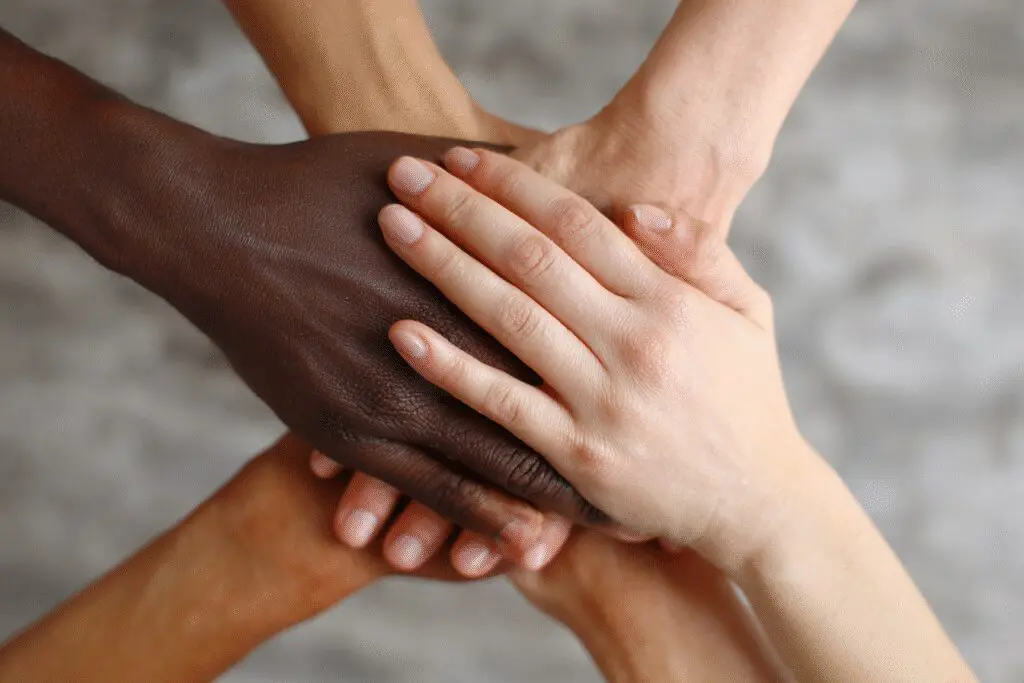Have you ever wondered where you truly belong? In a world that seems so focused on what divides us—our skin color, our background, our culture—it’s a question that can weigh heavily on the heart. We see the pain of division all around us, and it’s easy to feel lost. But what if our true identity wasn’t found in these earthly categories? What if our ultimate belonging was found in something, and someone, so much greater? This is the core question we’re going to explore, and the Bible has a powerful, life-changing answer. When we ask, what do the Bible say about racism, we find that God’s Word doesn’t just condemn it; it offers a radical new way of seeing each other through the lens of unity in Christ.
It’s a journey I’ve been on myself, trying to understand God’s heart for humanity. The noise of the world can be deafening, but when I turn to Scripture, I find a clear, consistent message: God created every person in His image, and His love knows no boundaries. This isn’t just a nice thought; it’s a foundational truth that challenges the very core of racism.
More in Ethics & Morality Category
Don’t Give Up Bible Scriptures
Key Takeaways
- The Bible teaches that all humanity is created in the image of God (Imago Dei), giving every person inherent dignity and worth.
- Racism is a sin that stands in direct opposition to the gospel message of reconciliation and unity.
- Galatians 3:28 is a cornerstone verse, declaring that our identity in Christ transcends all social, ethnic, and gender divisions.
- The early church, as seen in the book of Acts, was a multi-ethnic community, setting a precedent for believers today.
- True Christian faith calls us not just to avoid racism personally, but to actively pursue justice, love, and unity with all people.
Where Does the Concept of Race Come From, Biblically?
To understand what the Bible says about racism, we first have to ask: does the Bible even talk about “race” as we know it today? The modern concept of race, often based on skin color and physical features, is not something you’ll find in Scripture. Instead, the Bible speaks of people in terms of tribes, nations, and tongues.
Think about the story of the Tower of Babel in Genesis 11. God scattered people across the earth and confused their languages. This created different people groups and nations, but the focus was on language and location, not on a hierarchy of physical traits. The Bible celebrates this diversity! The book of Revelation paints a beautiful picture of heaven where people from “every nation, tribe, people and language” are standing before the throne, worshiping God together (Revelation 7:9). This isn’t a picture of conformity, but of unity in diversity.
So, the idea that one group of people is superior to another based on their “race” is a human invention, not a divine one. It’s a distortion of God’s beautiful and diverse creation. When we start with this understanding, we see that racism is built on a lie.
Are We All Descended from One Family?
Yes, absolutely. This is one of the most fundamental truths in the Bible. Acts 17:26 tells us that from “one man he made all the nations, that they should inhabit the whole earth.” Every single person on this planet, regardless of their appearance or origin, is a descendant of Adam and Eve.
This means we are all part of one human family. When I let that truth sink in, it changes everything. It means the person who looks different from me, who comes from a different culture, is not a stranger—they are family. Racism tries to build walls between us, but the Bible tells us we share the same blood, the same origin, and the same Creator. It’s a powerful reminder that our similarities run far deeper than our superficial differences.
What Does the Old Testament Say About How to Treat Foreigners?
The Old Testament is filled with instructions from God to the people of Israel about how they were to treat foreigners, or “sojourners,” living among them. These weren’t just suggestions; they were commands rooted in God’s own character and Israel’s history.
Time and time again, God reminds them, “Do not mistreat or oppress a foreigner, for you were foreigners in Egypt” (Exodus 22:21). This command is deeply personal. God is telling them to remember their own experience of being vulnerable and oppressed. He wants them to develop empathy and compassion for the outsiders in their midst.
This wasn’t just about being nice. The law demanded justice and equality for the foreigner.
- Equal Justice: Leviticus 24:22 says, “You are to have the same law for the foreigner and the native-born.” There weren’t supposed to be two sets of rules.
- Provision and Care: Deuteronomy 10:18-19 tells us that God “defends the cause of the fatherless and the widow, and loves the foreigner residing among you, giving them food and clothing. And you are to love those who are foreigners, for you yourselves were foreigners in Egypt.”
God’s heart for the marginalized is crystal clear. He commands His people to actively love and care for those who are different from them. This sets a powerful foundation for understanding that prejudice and discrimination have no place among God’s people.
How Did Jesus Confront Prejudice in His Ministry?
When we look at the life of Jesus, we see a masterclass in breaking down social and ethnic barriers. Jesus constantly challenged the prejudices of His day through His words and, more importantly, His actions. The culture He lived in was deeply divided, especially between Jews and Samaritans. These groups hated each other, yet Jesus went out of His way to show love and respect to Samaritans.
The most famous example is the parable of the Good Samaritan in Luke 10. A Jewish expert in the law asks Jesus, “Who is my neighbor?” In response, Jesus tells a story where the hero is a Samaritan—the person his audience would have despised. It was a radical, counter-cultural message. Jesus was redefining “neighbor” to mean anyone in need, regardless of their background.
Did Jesus Interact with People from Other Ethnic Groups?
Jesus didn’t just talk about loving others; He lived it out. Think about His encounter with the Samaritan woman at the well in John 4. This was shocking on multiple levels. He was a Jewish man, a rabbi, speaking to a Samaritan, a woman, and a woman with a questionable reputation. His own disciples were stunned when they saw it.
But Jesus saw her not as a member of a despised group, but as a person with deep spiritual thirst. He offered her “living water” and revealed Himself as the Messiah. This interaction shows that the gospel is for everyone. Jesus’s love breaks through every wall we build. He saw people, not labels. This is the example we are called to follow. We are to see the person in front of us, made in the image of God, and extend the same love and respect that Jesus did.
What is the Meaning of Galatians 3:28 for Racial Unity?
Now we come to one of the most powerful verses in the entire Bible concerning unity: “There is neither Jew nor Gentile, neither slave nor free, nor is there male and female, for you are all one in Christ Jesus” (Galatians 3:28).
Let’s break this down. Paul is writing to the Galatian church, where some people were teaching that non-Jewish Christians (Gentiles) had to follow Jewish laws to be truly saved. Paul passionately argues against this, declaring that our salvation and our standing before God are based on faith in Jesus Christ alone.
In this context, Galatians 3:28 is a revolutionary statement. Paul is saying that in Christ, the social and ethnic distinctions that the world sees as all-important are stripped away.
- Jew nor Gentile: This was the primary ethnic and religious division of the ancient world. Paul says it no longer defines who we are.
- Slave nor Free: This addressed the deep social hierarchy of the Roman Empire. In Christ, a slave and their master are brothers.
- Male nor Female: This challenged the patriarchal culture of the time, affirming the equal value of men and women in God’s eyes.
The point is not that our ethnicity or gender are erased. A Jewish person is still Jewish, and a man is still a man. The point is that these things are no longer the basis of our identity or our worth. Our primary identity is now “in Christ.” This new identity unites us in a way that is far more profound than anything that could ever divide us. For a deeper academic look into the social context of this verse, resources from institutions like the Duke Divinity School can provide valuable historical insights.
How Does Being “One in Christ” Eliminate Racism?
If we are all “one in Christ,” then racism becomes impossible to justify as a Christian. How can I look down on my brother or sister in Christ because of their skin color when God has declared us to be one? It makes no sense.
Being one in Christ means we are part of the same body. 1 Corinthians 12 talks about this in detail. The body has many parts—an eye, a hand, a foot—and they all look different and have different functions. But they are all part of the same body. The eye can’t say to the hand, “I don’t need you!” They need each other to function.
This is what the church is meant to look like. We are all different, with unique backgrounds and cultures, but we are all essential parts of the body of Christ. Racism is like a disease in the body, where one part attacks another. It goes against the very nature of who we are in Jesus. Our unity in Him is the ultimate antidote to the sin of racism.
What Was the Early Church Like Ethnically?
The book of Acts gives us a stunning look at the birth of the church, and it was a multi-ethnic, multi-cultural movement from the very beginning. The day of Pentecost in Acts 2 is a perfect example. The Holy Spirit comes down, and the apostles begin to speak in other tongues. Who was in the crowd? The Bible lists them out: “Parthians, Medes and Elamites; residents of Mesopotamia, Judea and Cappadocia, Pontus and Asia, Phrygia and Pamphylia, Egypt and the parts of Libya near Cyrene; visitors from Rome (both Jews and converts to Judaism); Cretans and Arabs” (Acts 2:9-11).
This was an incredibly diverse group of people, and they all heard the gospel in their own language. The church was born with a global, multi-ethnic DNA. This wasn’t an accident; it was God’s plan all along.
Were There Racial Tensions in the First Churches?
Yes, there were. The early Christians were still human, and they brought their cultural baggage and prejudices with them into the church. We see this in Acts 6, where a dispute arises between Greek-speaking (Hellenistic) Jews and Aramaic-speaking (Hebraic) Jews because the Greek-speaking widows were being overlooked in the daily distribution of food.
How did the apostles handle this? They didn’t ignore it or pretend it wasn’t happening. They addressed it directly. They appointed seven men, known to be full of the Spirit and wisdom, to oversee the distribution. It’s fascinating to note that all seven of the men chosen had Greek names, suggesting the apostles intentionally chose leaders from the marginalized group to ensure fairness.
We also see tension in the book of Galatians, where the Apostle Peter, out of fear, stops eating with Gentile Christians when some Jewish Christians arrive. Paul confronts him publicly, because Peter’s actions were betraying the truth of the gospel—that Jews and Gentiles are one in Christ (Galatians 2:11-14).
These examples show us two things:
- Racial and ethnic tensions are not new to the church.
- The right response is not to ignore them, but to confront them with the truth of the gospel and take practical steps to promote justice and unity.
What Is My Personal Responsibility as a Christian Today?
Understanding what the Bible says about racism isn’t just an academic exercise. It demands a response. If God’s Word is clear that racism is a sin and that we are all one in Christ, then I have a personal responsibility to live that out.
This starts in my own heart. I have to constantly examine my own attitudes and prejudices. Do I have biases I’m not aware of? Do I make assumptions about people based on stereotypes? This requires humility and a willingness to let the Holy Spirit search my heart.
But it doesn’t stop there. My faith must lead to action. James 2:1 tells us, “My brothers and sisters, believers in our glorious Lord Jesus Christ must not show favoritism.” The word for “favoritism” here is about judging people based on their outward appearance or status. True faith doesn’t just believe the right things; it acts in the right way.
This means actively loving my neighbor. It means standing up against injustice when I see it. It means intentionally building relationships with people who are different from me. It means using my voice and my resources to promote healing and reconciliation in my community and in the world. It’s about living out the love of Christ in a way that makes the gospel visible to a watching world.
Our unity is one of the most powerful testimonies we have. As Jesus prayed in John 17:23, “May they be brought to complete unity to let the world know that you sent me and have loved them even as you have loved me.” Our love for one another proves the love of God to the world.
Frequently Asked Questions – What Do the Bible Say About Racism

What does the Bible predict about the diversity of people in heaven?
The Bible, particularly in Revelation 7:9, describes heaven as a multitude from every nation, tribe, and language worshiping together before God’s throne, illustrating God’s ultimate plan for a diverse and united family.
How did the early church demonstrate unity despite cultural differences?
After Pentecost, the early church began to break down racial and cultural barriers, exemplified by the miracle of speaking different languages and by them caring for each other equally, showing that God’s family is for everyone.
What is the core message of Galatians 3:28 regarding race and equality?
Galatians 3:28 emphasizes that in Christ, all distinctions such as Jew or Gentile, slave or free, male or female, are irrelevant because all are one in Jesus, highlighting total equality before God.
How does the Bible address the division among different races and nations?
The Bible acknowledges that sin has caused divisions, but it also shows that God’s plan from the beginning was for all nations to be united through His love, as seen in the promise to Abraham that all families of the earth would be blessed.
What does the Bible say about the origin of all people?
The Bible, starting from Genesis, teaches that all people come from one family, originating from Adam and Eve, and that everyone is created in God’s image, highlighting the equality and value of all individuals.




